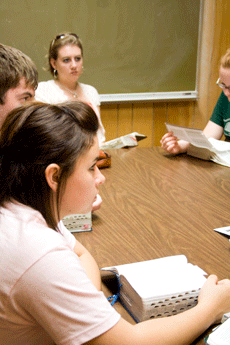Every Tuesday afternoon a group of about 10 students gather on the second floor of Ellender Memorial Library to study a book that is not taught at the University – the Old Testament. These students are members of The Church of Jesus Christ of Latter-day Saints, also known by their nickname, “Mormon.”
Sierra Trosclair, an elementary education sophomore from Houma, says the group gets together to study and discuss passages from the Bible and the Book of Mormon.
According to the Mormon Church Web site, The Book of Mormon is another volume of scripture that includes a collection of writings of ancient prophets and followers of Jesus Christ, translated by the Church’s founder Joseph Smith. It serves as a compliment to the Old and New Testament of the Bible.
Smith was 14 when he received a personal visitation from God and Jesus Christ while praying for guidance for which religion to choose in 1820. He became the prophet of the Restoration, which is the term used by the Mormon Church to mean the “true Church of Jesus Christ that was lost through apostasy.” Smith’s ministry soon branded him as a prophet.
Through his works, Smith turned a small hand of believers to a worldwide Church that exists today, according to the Mormon Church.
The Mormon Church has come into the political spotlight recently since Mitt Romney became the first Mormon Republican presidential candidate. Trosclair says she hopes he will not be judged on his religion but on his qualities as a person and a leader.
“Any citizen should be able to run – Catholic, Muslim, whomever,” Trosclair says. “It’s a free country and no one should be judged by [his or her] religion.”
Trosclair is one of many college students who practices her religion passionately, while still leading a “normal” college life.
She says the Mormon Church teaches its members to be modest and abstain from drinking and smoking. She says these things aren’t “prohibited” by the Church, but its members believe addictive substances, such as alcohol, smoking, coffee and drugs, can hinder the journey to become “the best person [one] can become.”
She says the Mormon Church focuses mainly on a person’s free will, and addictions take away that right. These “rules” have become a way of life for Trosclair, who says she doesn’t feel they are strict.
“I don’t think I’m missing out because I can do everything normal people can do,” Trosclair says. “For example, I’m in a sorority, and I’ve been out [to socials] before. I just have morals and stay true to myself.”
Trosclair says people respect her for not drinking and smoking, and she does not feel pressured to do it. Aside from being in Delta Zeta, Trosclair works at Aeropostale, is a resident assistant at Ellender Hall and is head of her church’s youth group.
On Sunday she attends sacrament meetings at The Church of Jesus Christ of Latter-Day Saints on Hwy 311 from 9 a.m. to noon, where members of the Church congregate to worship, attend Sunday school and separate for individual lessons for men and women. The lessons include a range of topics including family, education, physical health and service to others.
Monday is Family Home Evenings, where families usually get together for a quick lesson, dinner and companionship.
“Since college students are away from their families, we get together as one [family],” Trosclair says.
Her latest lesson was “5 Ways to Survive College,” which included tips, scripture references and conversation between attendees.
Her strategy included making and pursuing goals, prioritizing, keeping good company, avoiding discouragement and finding joy in oneself.
Although raised in the Mormon Church, Trosclair was able to visit other churches and “truly find where [she] needed to be.” She says she believes every church has truth in it and contains good people.
Trosclair encounters many misconceptions about her religion, and she has to defend it almost every day.
One common misconception is the Mormon Church is not Christian. Trosclair says the name Jesus Christ is in the Church’s name; they do believe in His works and are a sect of Christianity.
Another question Trosclair receives often regards polygamy. She says polygamy, or multiple marriages, is no longer practiced. She says it is hard for people to understand how God would command people to have multiple wives and then take it away.
When the Church began in the 1800s, members were not able to worship because of persecution, so they moved from state to state, with the men on foot. When they reached an area to settle, far less men than women survived and polygamy happened to recreate their population.
Polygamy officially ceased in 1890 after the president of the Church issued the Manifesto. The Mormon Church does not approve of plural marriages, and any member adopting these practices may lose his or her membership in the Church, according to the Church’s Website.
Trosclair says defending her religion may be a part of her daily routine, but there is more to her religion than that.
She says the Church focuses on people’s free will to worship how they want while trying to provide guidance. Her focus is putting God first and trusting everything else will fall into place.
Trosclair says she often considers how it would be to not get questioned about her religion continuously or to not be labeled as “Mormon” or “that kid who doesn’t drink.” These are minor aspects of her faith, and she wouldn’t change it for the world, Trosclair says.
“It’s not going to matter what people think about me in the end,” she says. “It’s about what the man upstairs thinks.”
. It’s how I believe in myself and the way I live. I’m proud of that.








